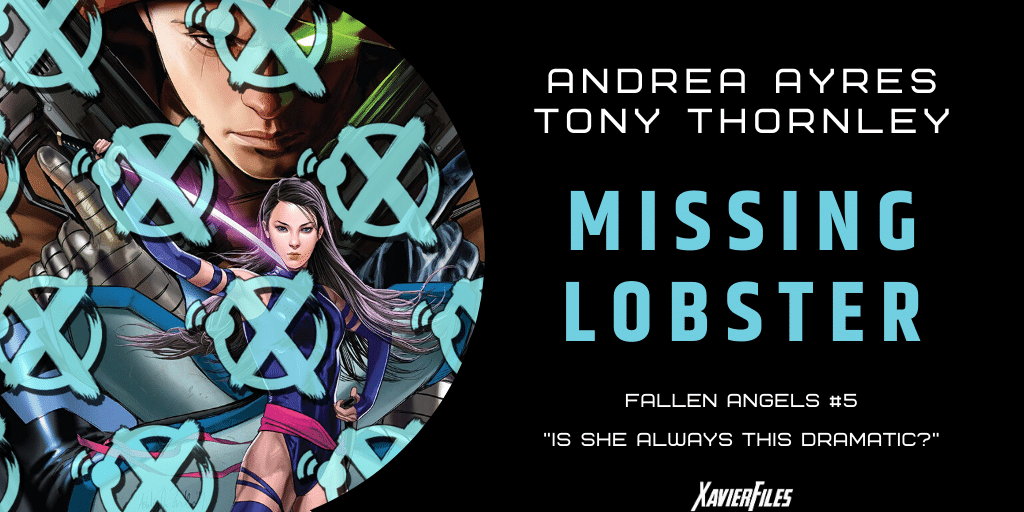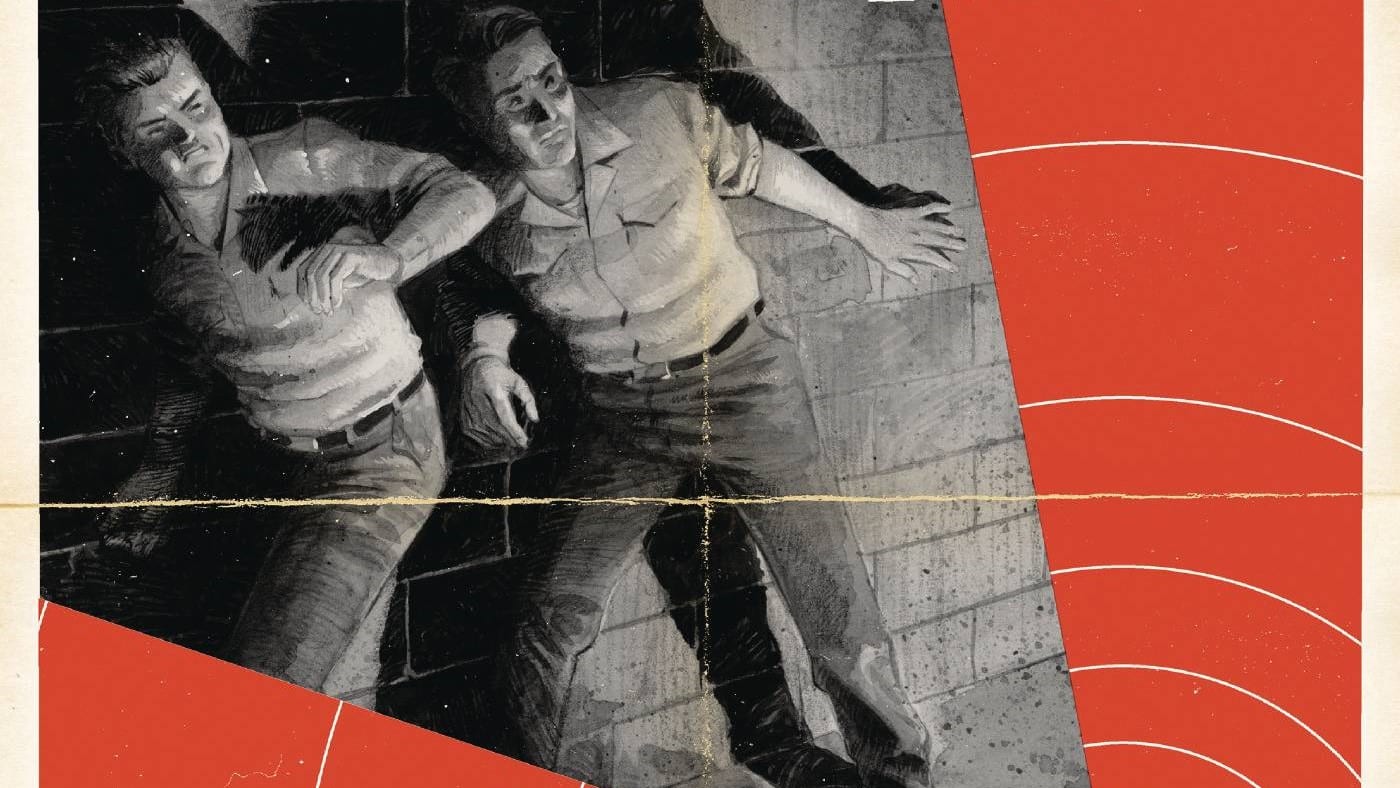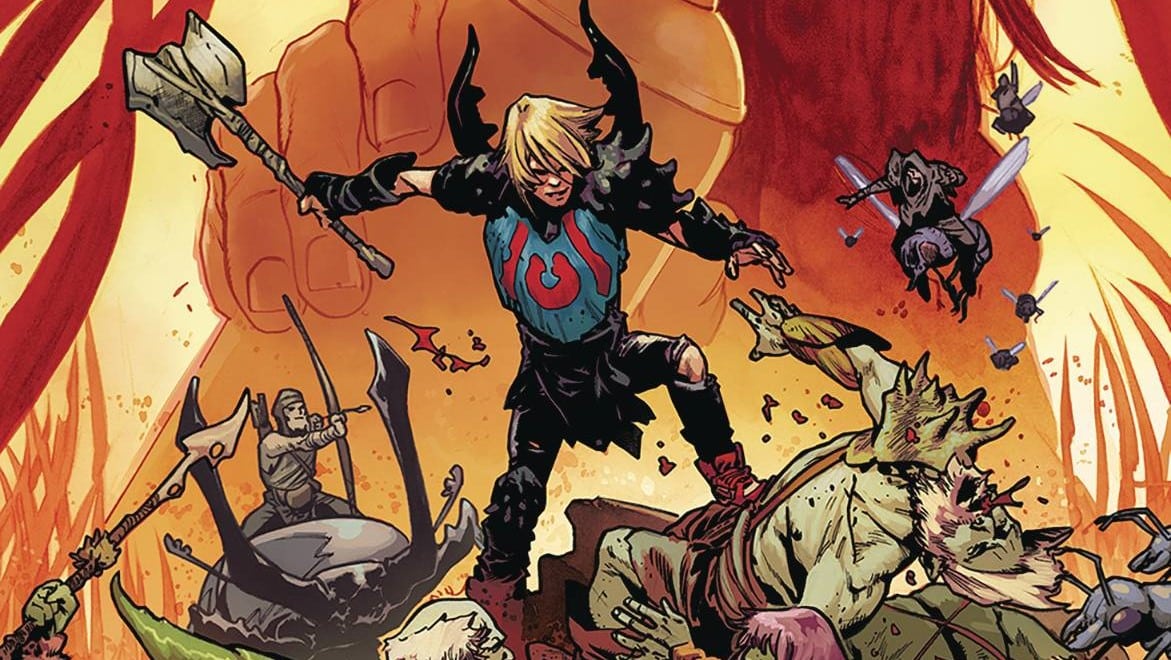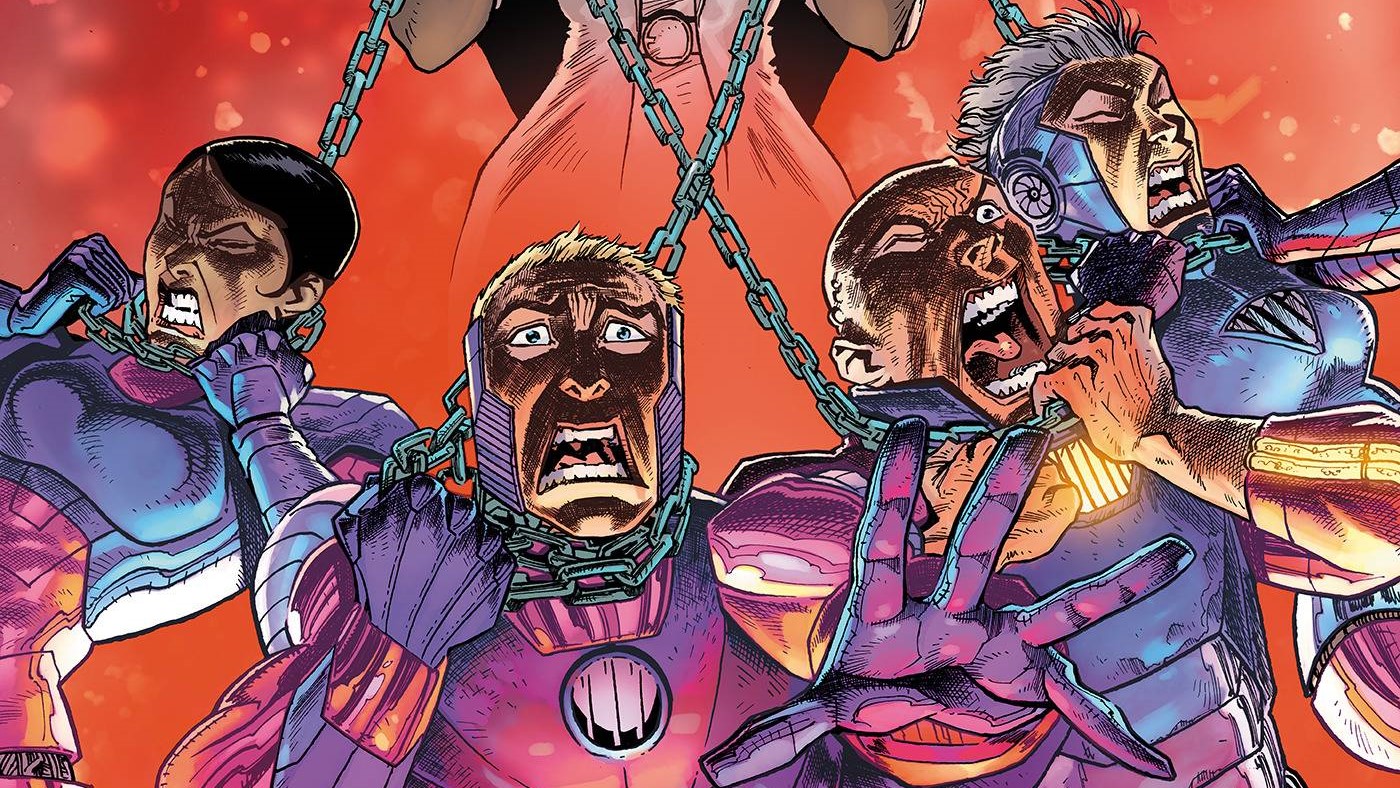Fallen Angels #5 is here and it’s time to squad up. Bryan Edward Hill, Szymon Kudranski, and Frank D’Armata return in the penultimate issue. Husk and Bling! join Psylocke and company on their mission to stave off Apoth and his children! Then – Cable turns on X-23?!?
Andrea Ayers: And we’re back, back again. A week earlier than either of us anticipated but that’s okay with me. In Fallen Angels #5, Bling! and Husk join X-23, Cable, and Psylocke to help bring down Apoth. Of course, it’s not easy to track what is happening at any real point in this series because the characters are constantly speaking past one another. No, that’s not it. They are speaking to a narrator the reader cannot see, hear, or really understand. It’s been happening for me since the beginning of the series and now. Well, now I’ve got trust issues (so does Bling!).
Trust Issues

Tony Thornley: Oh my gosh, Bling! is all of us. This opening scene was really jarring, and I couldn’t put my finger on it. You absolutely did though. These are people talking AT each other, not WITH each other. I’m also not totally sure WHY these mutants are together as a team. There’s no motivation here. Bling! I get somewhat, because she’s always been a little “on the outside” and rebellious. Paige though… Outside of Wolverine & the X-Men, she’s always been the X-Manny-est X-Man who ever X-Manned. She was even on Cyclops’ A-team in House of X for attacking Mother Mold.
AA: Speaking of Husk… that is what these characters are to me. They are mere shells and whispers of the characters they should be. It’s easy to see that at some point, there was a framework the creative team was working towards but something happened. I don’t know what that something is, but the net result is a story that feels stunted. The best way I can describe it is like going for a walk and walking into a wall every 25-ft. I don’t know, how do you feel about it, Tony?
TT: Remember last issue how I said it felt like an improvement? I feel like this issue continues that upward trend, but it also doesn’t resolve those issues it had. We’re getting a lot of information, we’re getting a lot of plot, and so on. But it meanders and wanders all over the damn place. However, characters are feeling a bit more like themselves, and the art is generally doing a better job. But you’re absolutely right about how they’re interacting.
AA: A good example of this comes early on when Psylocke and Laura have a discussion about whether or not they believe in God. In conversation someone speaks for a turn, then a response is given. The other individual tends to respond to whatever their speaking partner says and this continues. That’s what happens in a good conversation with both parties being active listeners. That’s not what is happening here, or pretty much ever in Fallen Angels. The characters consistently cut off conversations by just walking away, never addressing obvious elements of their past or seeking to further elucidate the audience as to, you know, that little thing we like to call character development.
TT: This is incredibly glaring in the call and response of the first scene too. It’s almost there, but reading it through a second time, they’re barely listening to one another.
AA: I swear to you, it’s like seeing a conversation between my twin and I come to life. Which usually goes something like this:
Twin 1: “Oh hi, how are you.”
Twin 2: “Had to get more shrimp from the store.”
Twin 1: “Can’t believe this news item, can you believe this news item?”
Twin 2: “…”
Twin 1: “Are you watching TV dude?”
Twin 2: “I’m fine, what about you?”
Like the characters of Fallen Angels, each twin is responding to whatever they assume the other person said or will say. Or they are responding to a conversation they’ve already started half-way in their head and never actually got to saying out loud. That’s what grates on me about this narrative so much, it’s just disconnected plot points and characters jumping wildly from one to the other in the desperate hope that someone, somewhere, will be able to make sense of it.
TT: I have to say this goes double for the sudden one page flashback too. First of all, do we need more of “Kwannon was a bad person” than we already did? But oh my goodness does her mentor ever just talk at her! It’s all about holding onto her anger and using that to fuel her, and did I miss where that came from? It’s so out of the blue, and Kwannon just stands there getting talked at…
AA: Right? Violence is fuel. Violence is the answer! Yawn. You will never no peace, yadda, yadda, yadda…
This lack of development, that none of us (including these characters) ever get to spend more than a sentence addressing their past or what has occurred in previous issues gives me the feeling that everyone involved is just trying to end this series as quickly as humanly possible. Emotional scenes, like the one between Psylocke and Sinister, are meant to carry some sort of weight. The audience is meant to feel apprehension at what might occur but instead, there is just a flatness.
Sinister warns Psylocke she will feel extreme pain, that her mind may shatter. The artwork does not display any kind of emotion on her face. What I am guessing is meant to look like a steely resolve, just looks emotionless. That’s why the trust a creative team builds with a reader matters. When it isn’t there, the reader doesn’t give the character the benefit of the doubt. We don’t know these characters well enough or their motivations, to care in the way we should. It feels as if the team here is instead relying on the readers’ previous knowledge to do the heavy lifting of tying the loose ends of this script together. As I said, I have trust issues but I know I’m not the only one.
TT: To go with this, this scene is just so messy for me. Just some points I have to mention:
- Sinister is a geneticist not a comms tech guy. Why is he reprogramming an Overclock gizmo?
- The “steely resolve” is so serious that even when Psylocke put through enough pain that she collapsed out of her chair, she stands up an instant later like nothing happened.
- The “contained cyberspace” technobabble is too much for me. I am a huge Star Trek guy so technobabble is my s-word. But the whole idea is that you have to make it sound plausible. This? It doesn’t come CLOSE.
- Actually, everything Sinister says in this scene is just… It’s pure cringe. Either it doesn’t make sense or it’s so melodrama that I can’t handle it.
AA: I am standing. I am applauding. I am screaming your praises with this Tony. You just touched on everything I wish I would have already touched on here. The technobabble is definitely ROUGH. The technobabble of Star Trek tends to work because at the very least it seems tied to real world concepts and applications.
Early in the issue, Laura is responsible for putting together the squad to help take down Apoth because Psylocke apparently has no reputation. At the end of the issue, Psylocke asks the characters to trust her on the basis that she is willing to die and kill for them? I don’t know. I just feel like I missed a few paces here that I wish I could have seen. Alas.
Cavalierness Of Genocide

AA: Cable tells us he doesn’t ‘do genocide.’ Good on you buddy. That’s pretty much the bare minimum of what we can ask of others: don’t commit in the ritualistic and systemic murder of a national, ethnical, racial, or religious group. I know, genocide. A pretty heavy topic but deal with it.
TT: It’s extremely heavy, and especially for Cable.
AA: What irks me about the representation of genocide in Fallen Angels is that once again, we see this terminology thrown out without any scaffolding to help the reader orient themselves. Genocide is more than just ritualistic killing, which Apoth certainly wishes to commit, it is an entire system.
Former Obama UN ambassador, Samantha Power famously refers to it as “a problem from hell.” Even someone who wrote the book about the US’s consistent and consequential lack of preventing or stopping genocide, went on to be part of an administration who took little action to stop the ongoing war crimes in Yemen and Syria. I bring this up because to mention genocide, to throw the word out in the way Cable has and then to simply move on from it, does the word and the issue a grave disservice. Using the phrase genocide has real-world consequences [Ed. note: Behrens, Paul, From Abstraction to Intent: The Law of Genocide and Its Insights into the Genocidal Mindset (January 30, 2017)]. This is not to imply that we can’t use it in a creative setting, but we should be mindful of its usage.
Cable says, “Apoth wants the “end of all difference.” That sounds like genocide. I don’t do genocide.”
This would necessitate at least a response right? We don’t get that, instead, Husk simply asks whether or not Psylocke is crazy. What in the actual hell? Invoking the word genocide should terrify us. It should chill us. Does it?
TT: Okay, that really jumps out at me too and for a different reason. This is should be a much bigger deal than it is here, especially considering by the end of the issue, Apoth just straight up drags himself out of the shadows and starts slaughtering people by the end of the issue. But for Cable that goes extra, because HIS ENTIRE THING IS TO STOP GENOCIDE.
Cable’s entire deal is that he’s a freedom fighter, who has been fighting an oppressive regime systematically executing an entire people. He fought Apocalypse and Stryfe in the future to prevent the genocide of the human race. His older self came back to his home time to stop Apocalypse before the CENTURIES worth of genocide after he decided that was a good idea. Someone at editorial decided in the last five years that Cable’s thing should be time cop, but it’s not. It’s altering the timeline to prevent centuries worth of genocide!
For Cable, this shouldn’t just be “standing in a white room with three people being mildly angry.” He should be climbing the walls, pulling guns out of every hiding spot he has on the island, and barely being held back by anyone trying to get him to slow down. He should be red faced at the fact that thirty minutes later he’s standing on a cliffside watching three experienced X-Men being kind of flippant about what they’re training for. His older self, maybe, would be a bit more measured and even keeled, but this version of Cable is still hot headed and impulsive.
If there’s ANYONE who the thought of genocide should push over the top, it’s Nathan Christopher Charles Dayspring Askani’son Summers. And instead of that, we get “I don’t do genocide.”
AA: Oh my gosh Tony. Yes. I don’t even know if I can add anything to that. Just yes.
The premise of Apoth is that he’s using children to do his bidding with the help of the drug Overclock. The sad and horrific truth about genocide is that frequently no drug or mind control is necessary. This is explored in the 1992 work by Christopher Browning called Ordinary Men. The book is about how the work of state-sanctioned killing is not done by evil people, by monsters, but instead, by folks with traits, many of us can recognize. The machinery of genocide contorts and changes people and examining that machinery is something quite essential.
We see in Apoth the same words and phrases used by authoritarians today. He alone is the strong man who can bring about our evolution, our peace, and salvation. All it requires is the remaking of a people or place. This characteristic of Apoth is one that is done relatively well. It displays the artful use of demagogic language by those in power. Authoritarian leaders use broad, sweeping and generic terms rooted in emotion to appeal to the masses. Those listening to words here the contours of an argument and then fill in the rest of it with their own fears, beliefs, and bias.
TT: Though his choice of target? That strikes way too close to the real world. The Middle East should by no means be excluded by popular culture, but using a Middle Eastern city as a target of a terrorist attack by an authoritarian regime? It doesn’t sit right at all.
AA: Qatar is the richest country in the world. The United Arab Emirates (where Dubai is located) is the seventh richest. I think it is a (poor) attempt at getting people to not center their imagining of a cosmopolitan, modern city in the West. I don’t think it’s successful in this because it feels arbitrarily thrown out there but, maybe? Tony. A real question…do we mention the Matrix scene Tony? Do we broach the topic? [Ed. note: No]
Trauma & Violence As Purpose

AA: One of the more difficult components of this entire series is the complete disregard everyone seems to have for the trauma these people have endured and continue to endure. It begins with, as you’ve touched on a bit Tony, with that beginning sequence between Cable, Husk, and company. We don’t spend time with the fact that Cable was held and tortured in the last two-ish issues but beyond that it seems like the trauma these people have endured is merely a means to an end. It makes us wonder, is it worth it? Is there any emotional resonance here? No. There isn’t. That’s why, as a reader, I didn’t care about what was supposed to be a rousing speech from Psylocke at the end of this issue.
TT: Honestly (except for Bling!) these are all profoundly traumatized characters. Laura was emotionally abused and manipulated (and much much worse) her entire life until she came to the X-Men. Cable has been fighting an unwinnable war HIS ENTIRE LIFE and now has to accept that his foe is an ally. Paige JUST dealt with a severely traumatic emotional and mental breakdown in her last significant appearance, then died immediately prior to this issue. I’m not familiar enough with Bling! to know if she’s gone through anything similar, but it could be there.
However, none of those things are used as a common unifier or anything. I have no idea why Laura chose these two. Are they kindred spirits because of the trauma they’ve gone through? Are they supposed to act as a stabilizing and balancing influence? And once again we go back to the cipher of Kwannon as Psylocke as if we’re supposed to know her history and trauma.
AA: I think that’s exactly what I’m trying to get at, though you say it more succinctly and directly. We are supposed to care that Kwannon is finally feeling like she has reunited or at least found a kind of peace with the disparate components of herself?
“Conscience isn’t based on debt. Conscience is purpose. And finally, I have mine.”
Here, Psylocke is responding to Sinister’s statemate that humans are not owed saving. Which, alright… I don’t this again feels like a line that could have made an impact had we been privy to you know, the exact process of how Psylocke gained her purpose, her conscience beyond weird flashback sequences and implied growth. She has found a purpose and that should mean something to the reader. But since no part of the narrative has been given the space to breathe, for us to establish an emotional connection to what we can only assume is the work that had to have taken place to get there.
That is of course when the creative doesn’t become uncomfortable with its seriousness. This squad is supposed to be stopping a genocide. They have seemingly assembled for this express purpose, buoyed in part by their past experiences. Psylocke has asks for the honor of leading the team, to which Bling! asks if she is “always this dramatic?”
Why undercut that moment? I get it’s not uncommon to try to inject a bit of levity into situations, but this series of panels simply felt so awkward to me. It nearly undoes all the work of the previous five pages. Like, that’s how bad it reads the moment.
TT: But to answer Bling!’s question? Yes. Yes she is.
AA: True story Tony. True. But you know, I saw her smile once….
TT: I do feel like this issue is an improvement, but it’s also too little too late. If there were another arc coming after this, I’d have hope for the series- both the story and the art. As it stands though, it seems to be setting up a rushed conclusion on the twenty-ninth. But hey, maybe everyone will finally feel like themselves.
X-Traneous Thoughts

- It looks like Apoth and Psylocke will meet IRL. Finally.
- Is Cable ever actually going to be a character in the series he’s co-headlining? We’ll find out in the conclusion.
- Bling! really is just an audience stand-in in this issue.
- If Laura has learned anything from Psylocke in this last five issues, it appears to be the ability to be condescending to experienced superheroes.
- We have a Fallen Angels book with 0 Lobster content yet again.
- Krakoan reads: Apoth
- It’s almost over.
Andrea Ayres writes about comics and culture. She loves research, coffee, and lifting weights.
Tony Thornley is a geek dad, blogger, Spider-Man and Superman aficionado, X-Men guru, autism daddy, amateur novelist, and all around awesome guy. He’s also very humble.







